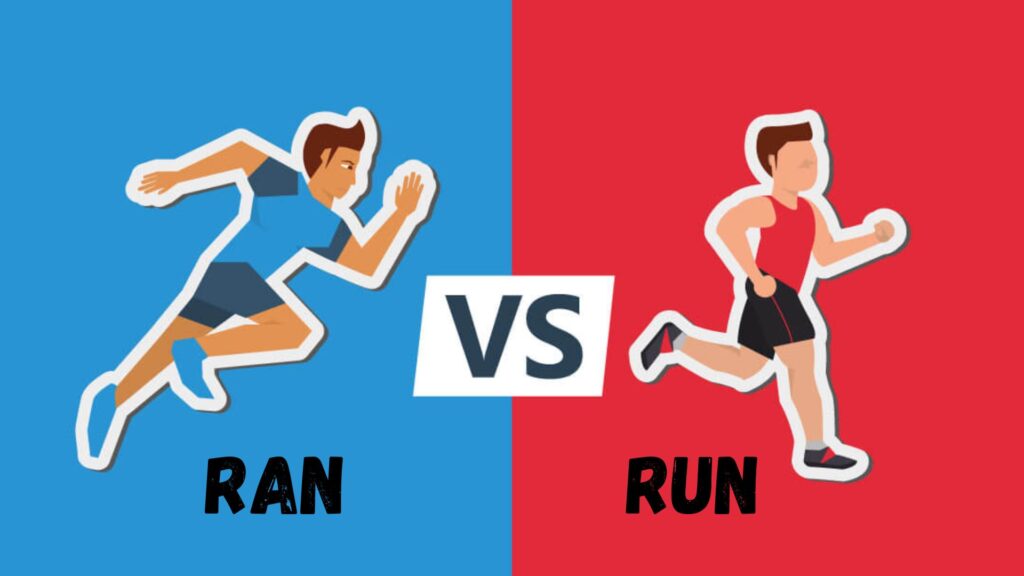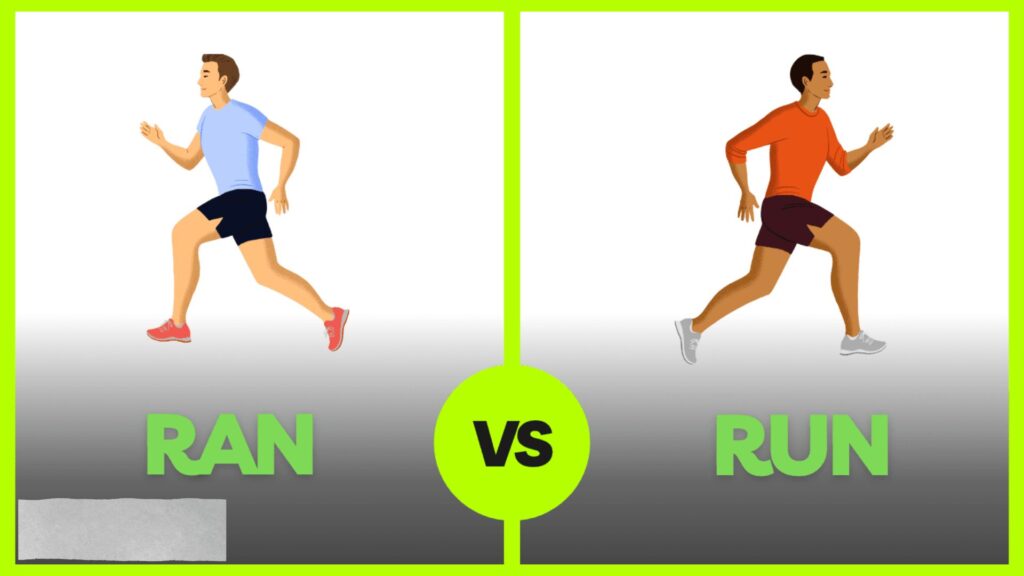If you’ve ever paused mid-sentence wondering, “Is it ran or run?”, you’re not alone. These two forms of the same verb often trip up even fluent English speakers because “run” is an irregular verb with unique conjugation rules. In this guide, we’ll break down everything from the run past tense to its past participle, show real-life examples (including emails), and even clarify tricky idioms involving “run.”
✅ Ran vs Run: Quick Definition & Overview

Here’s the short answer:
- Ran is the simple past tense of “run”.
- Run is the past participle form, used with auxiliary verbs (has, have, had).
👉 Example:
- Past tense: Yesterday, I ran five miles.
- Past participle: I have run every day this week.
🕑 Verb Forms of “Run”
Here’s a Quick-Reference NLP/Grammar Map for all forms of run:
| Tense | Form | Example Sentence |
|---|---|---|
| Present Tense | run | I run every morning before work. |
| Simple Past | ran | She ran to catch the train. |
| Past Participle | run | They have run three marathons. |
| Present Participle | running | He is running around the track. |
| Past Perfect | had run | By noon, we had run out of water. |
| Future Perfect | will have run | By 5 PM, I will have run ten miles. |
This table clears up the verb tenses of run and how each form fits into context.
🔑 When to Use “Ran” (Simple Past Tense)

You use ran when talking about a completed action in the past, with no connection to the present.
Examples of “ran” in sentences:
- Lisa ran through the park yesterday.
- We ran late for the meeting last night.
- James ran to catch his flight and barely made it.
📧 Email Example Using “Ran”:
Subject: Yesterday’s Team Event Recap
Hi Mark,I wanted to thank you for joining the charity race yesterday. I ran alongside the group and noticed how well everyone performed! Looking forward to our next event.
Best,
Sarah
🔑 When to Use “Run” (Past Participle)
Run is the past participle, used with helping verbs (has, have, had) to describe actions linked to the present or completed before another past event.
Examples of “run” in sentences:
- She has run three successful marketing campaigns.
- We had run out of time before the deadline.
- They have run marathons across different countries.
📧 Email Example Using “Run”:
Subject: Project Update
Hi Jenna,I’ve run multiple tests on the new software, and all of them passed without errors. We’ve also run the analytics reports for Q2 as requested.
Thanks,
Kevin
🏃♂️ Why “Run” Is an Irregular Verb
Unlike regular verbs that simply add -ed (e.g., “walk → walked”), run is an irregular verb. It shifts forms unpredictably:
- Present: run
- Past: ran
- Past Participle: run
Understanding these grammar rules for irregular verbs is crucial because using “I had ran” instead of “I had run” is a common mistake that signals poor verb conjugation.
🗣 Idiomatic Expressions with “Run”
English is filled with idioms that feature “run.” Here are a few popular ones:
- “Run a tight ship” – to manage efficiently (e.g., “Monica runs a tight ship at the office.”)
- “Run in the family” – describing inherited traits (“Artistic talent runs in the family.”)
- “Run out of time” – to have no time left (“We ran out of time to finish the presentation.”)
Idioms like these are excellent for sounding fluent and natural.
📝 Common Mistakes & Fixes
Here’s a quick guide to avoid errors:
❌ I have ran five miles.
✅ I have run five miles.
❌ He had ran late yesterday.
✅ He had run late yesterday.
Tip: Remember if you see has, have, or had, follow it with run, not ran.
🔄 Ran vs Run in Perfect Tenses

- Present Perfect: I have run a mile every day this week.
- Past Perfect: Before lunch, she had run all her errands.
- Future Perfect: By the end of the month, we will have run all necessary tests.
🏅 Examples of Run in Different Contexts
Everyday Speech:
- “I ran to the store.” (simple past)
- “I’ve run errands all morning.” (present perfect)
Formal Writing:
- “The company has run successful pilot programs.”
Technical/Business Context:
- “We had run several diagnostics before deploying the update.”
🎯 Key Takeaways
- Ran = Simple past tense for completed past actions.
- Run = Past participle, always paired with helping verbs (has, have, had).
- Remember: “I ran yesterday”, but “I have run many times this week.”
✅ Quick Reference Table (At a Glance)
| Form | Usage | Correct Example |
|---|---|---|
| Ran | Simple Past | She ran yesterday. |
| Run | Past Participle | I have run tests. |
By keeping these rules in mind and practicing with real-life sentences you’ll never second-guess ran vs run again.

